Over 30 years of anarchist writing from Ireland listed under hundreds of topics
The basics of Participatory Economics
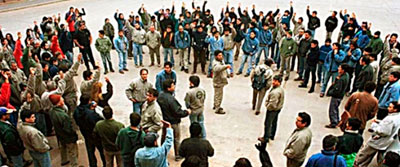 In the last issue we had a missive from the future. It told us of the great changes in the post-revolutionary anarchist world. In this article of the future society series, I will focus solely upon an anarchist vision of a future economy. This is called participatory economics, often abbreviated parecon, a classless economic system proposed primarily by activist and political theorist Michael Albert and, among others, economist Robin Hahnel. The model was developed through the 70s and 80s and the first exclusively parecon books were published in 1991. Many of their early writings concentrated on what they perceived as flaws in Marxist and Marxist-Leninist theory.
In the last issue we had a missive from the future. It told us of the great changes in the post-revolutionary anarchist world. In this article of the future society series, I will focus solely upon an anarchist vision of a future economy. This is called participatory economics, often abbreviated parecon, a classless economic system proposed primarily by activist and political theorist Michael Albert and, among others, economist Robin Hahnel. The model was developed through the 70s and 80s and the first exclusively parecon books were published in 1991. Many of their early writings concentrated on what they perceived as flaws in Marxist and Marxist-Leninist theory.
Using the Organiser Model to Beat the Household Tax
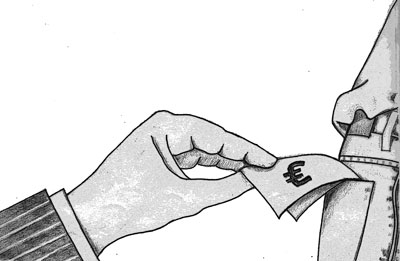 The new year brings a new tax from the Irish government and a new fight in the shape of the campaign against this household tax. Although we have beaten such taxes in the past, past victories are no guarantee of future success. In the light of the current low level of organisation and self-confidence amongst our class, we need to re-assess our methods of organisation if we aim to achieve the levels of mass participation needed for a victory. The argument of this article is that the existing traditional models of building local campaigns are not sufficient to the task and that we need to look to a new model of organising - the organiser model.
The new year brings a new tax from the Irish government and a new fight in the shape of the campaign against this household tax. Although we have beaten such taxes in the past, past victories are no guarantee of future success. In the light of the current low level of organisation and self-confidence amongst our class, we need to re-assess our methods of organisation if we aim to achieve the levels of mass participation needed for a victory. The argument of this article is that the existing traditional models of building local campaigns are not sufficient to the task and that we need to look to a new model of organising - the organiser model.
Revolution & Counter Revolution in Barcelona
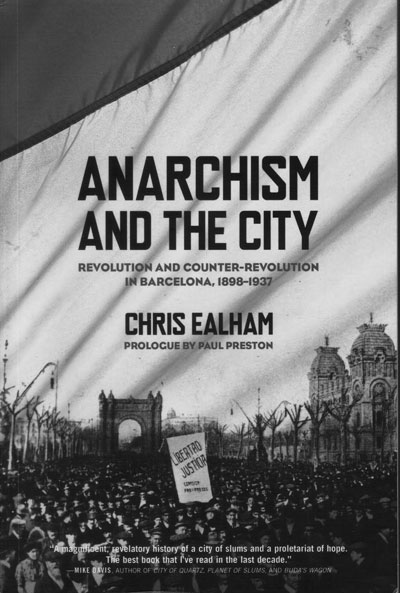 Seventy-five years ago, in Barcelona and across much of the rest of Spain, anarchists and other radical workers, in order to stop Franco’s attempted coup, stormed army barracks, took over the factories and kicked off “the greatest revolutionary festival in the history of contemporary Europe.”(p.173). A familiar story no doubt, however, unlike many ostensible working class histories of the period, that are often just histories of workers’ organisations, Ealham’s engaging writing and theoretical fluency give us a complete view of proletarian life, from community centres in the city’s slums, to unemployed groups of shoplifters, to general strikes and uprisings.
Seventy-five years ago, in Barcelona and across much of the rest of Spain, anarchists and other radical workers, in order to stop Franco’s attempted coup, stormed army barracks, took over the factories and kicked off “the greatest revolutionary festival in the history of contemporary Europe.”(p.173). A familiar story no doubt, however, unlike many ostensible working class histories of the period, that are often just histories of workers’ organisations, Ealham’s engaging writing and theoretical fluency give us a complete view of proletarian life, from community centres in the city’s slums, to unemployed groups of shoplifters, to general strikes and uprisings.
Queer Liberation
Workers Solidarity Movement position paper on Queer Liberation as re-written at the October 2011 National Conference. This position paper sits under the Sex, Gender, and Sexuality paper and does not repeat that material here.
Greece & the crisis - Seeds of Hope
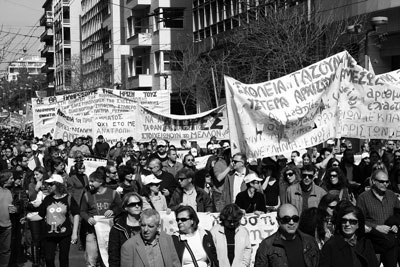 There is no doubt that the political history of Greece is full of oppression and political struggle - from dictatorships to political prosecutions, jailings, exiles, shootings, torture, civil war, and countless strikes, demonstrations, occupations and protests that are put down by extreme state violence.
There is no doubt that the political history of Greece is full of oppression and political struggle - from dictatorships to political prosecutions, jailings, exiles, shootings, torture, civil war, and countless strikes, demonstrations, occupations and protests that are put down by extreme state violence.
Dublin: Benefit night for sacked shop steward
Benefit gig for Eugene McDonagh Defence Fund to aid his upcoming Unfair dismissal Court hearing.
Eugene was a shop steward with Dublin Bus who was sacked over an unofficial strike in 2009,he had a record of opposing cuts in services and conditions and we believe was targetted because of this. Please pass on to all trade unionists and those concerned with injustice.
Music by trad/ballad group Boxty.
Clifton Court Hotel, Eden Quay
Sat. 22nd Oct. 8pm
Interview: Conor McCabe on Sins of the Father
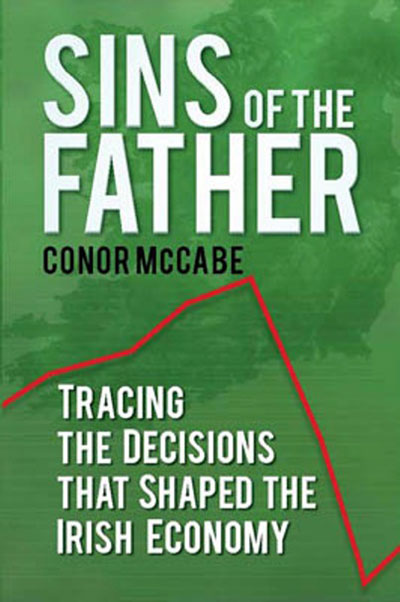 Journalist and writer Conor McCabe’s book ‘Sins Of The Father’ attempts, in the author’s own words, “…to shine a light on the reasons why Ireland has the businesses it has, and why banks and speculators yield so much power and influence.” The book has been acknowledged as a significant contribution to the analysis of the political and economic decisions that have brought the Irish economy to ruin. James McBarron interviewed McCabe for Irish Anarchist Review
Journalist and writer Conor McCabe’s book ‘Sins Of The Father’ attempts, in the author’s own words, “…to shine a light on the reasons why Ireland has the businesses it has, and why banks and speculators yield so much power and influence.” The book has been acknowledged as a significant contribution to the analysis of the political and economic decisions that have brought the Irish economy to ruin. James McBarron interviewed McCabe for Irish Anarchist Review
Review: Zapatista Spring
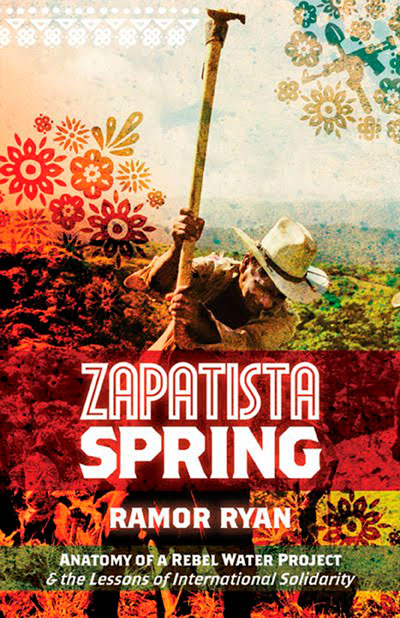 Editors’ Note: In this issue of the IAR we have the all too rare pleasure of reviewing a book by a fellow Irish anarchist. It’s Ramor Ryan’s Zapatista Spring, one of the most honest books yet published about the Zapatistas.
Editors’ Note: In this issue of the IAR we have the all too rare pleasure of reviewing a book by a fellow Irish anarchist. It’s Ramor Ryan’s Zapatista Spring, one of the most honest books yet published about the Zapatistas.
The Famine, the Land War & 19th Century Resistance- why is it not happening today
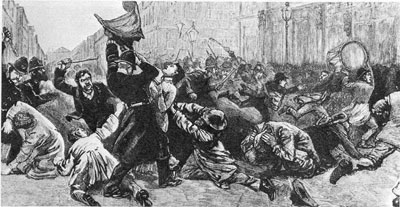 Over the past three years Ireland has witnessed unprecedented austerity. An aspect that has surprised many people has been the limited and at best sporadic resistance to what has been a savage cut in people’s standards of living. Politicians and the media have on many occasions relished the fact that resistance has been largely ineffectual and isolated, while many left wing activists have been left questioning why most people seem willing to take so much pain.
Over the past three years Ireland has witnessed unprecedented austerity. An aspect that has surprised many people has been the limited and at best sporadic resistance to what has been a savage cut in people’s standards of living. Politicians and the media have on many occasions relished the fact that resistance has been largely ineffectual and isolated, while many left wing activists have been left questioning why most people seem willing to take so much pain.

